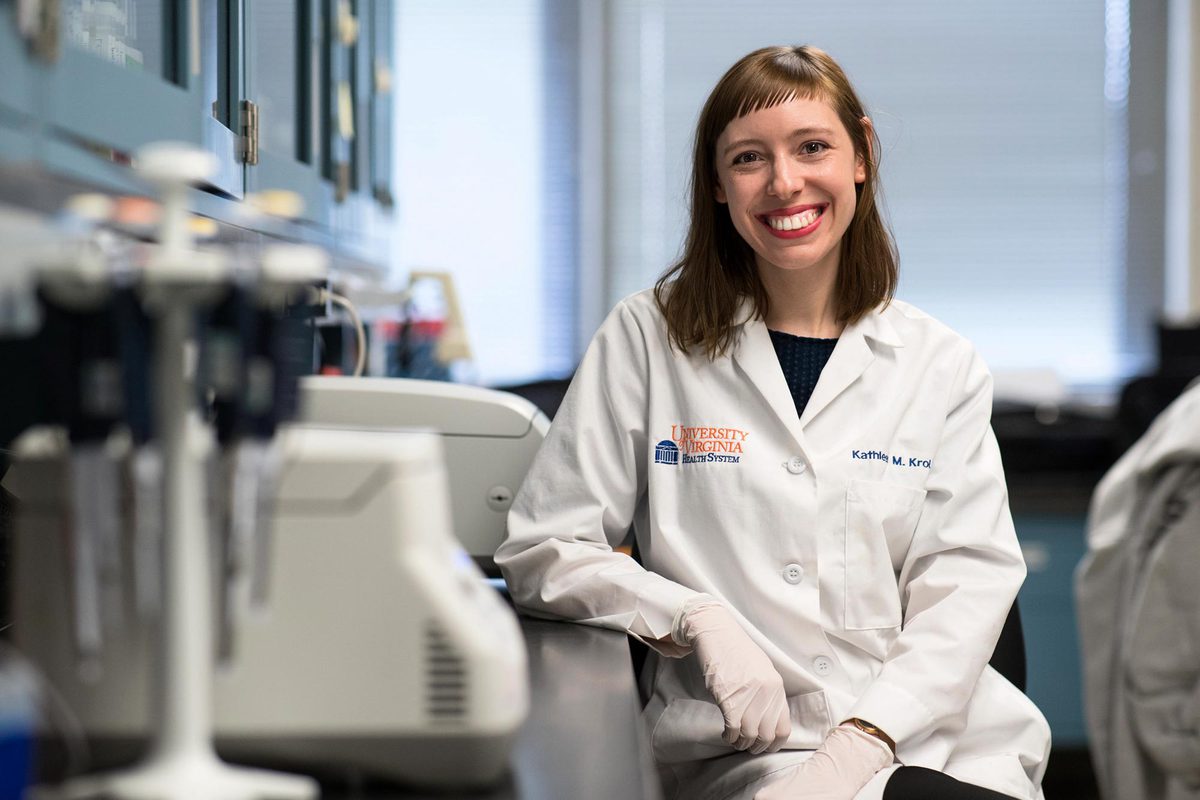The nature-vs.-nurture contributions to human behavior have fueled a long-running debate while serving as a continued topic of research. In the latest chapter, Kathleen Krol’s study of 101 babies and their mothers, the University of Virginia scientist sheds light on the role played by early parental care in the development of the oxytocin system.
Oxytocin is a hormone in the human nervous system that plays a key role in a person’s ease in forming relationships, caregiving and other social behavior.
While epigenetic modifications – chemical changes that have the capacity to affect how genes are expressed, without altering the underlying genetic sequence – occur naturally in the body and are involved in a number of vital processes, they also can be influenced by the environment, as was suggested in Krol’s study. The findings by Krol, a Hartwell Postdoctoral Fellow in UVA’s Department of Psychology, reveal that babies who are in close proximity to an attentive caregiver and who are talked to earlier by their caregiver display a reduction of epigenetic modification on the oxytocin receptor gene, ultimately suggesting an increase in receptors for oxytocin in the first 18 months of their lives.

“Successful interactions with caregivers are crucial as infants begin to navigate the social world,” said Kathleen Krol, a Hartwell Postdoctoral Fellow in UVA’s Department of Psychology. (Photo by Dan Addison, University Communications)
“We wanted to explore the hypothesis that maternal behavior early on might critically impact the development of the oxytocin system in infants,” said Krol, who began this work as a Ph.D. student with Tobias Grossmann at the Max Planck Institute for Human Cognitive and Brain Sciences in Leipzig, Germany. Krol has since been working in Jessica J. Connelly’s lab in UVA’s Department of Psychology, where she trained in the molecular biology techniques required for this multidisciplinary research.
“Our findings provide the first evidence that the endogenous oxytocin system, known for its essential role in processes crucial for human social interaction, is malleable in infants and can be shaped by the early caregiving environment,” Krol said.
Krol’s findings were published recently in a Science Advances research article with co-senior authors Connelly and Grossmann, associate professors in the Department of Psychology, as well as with Robert G. Moulder, a graduate student in quantitative psychology. Krol spearheaded this multi-lab collaboration as part of her Hartwell Postdoctoral Fellowship, in which she proposed to analyze this data in Connelly’s lab.
Krol continues her research in Connelly’s lab, which seeks to understand the relationship between DNA methylation (a process by which methyl groups are added to specific sites on the gene) of the oxytocin receptor and individual differences in behavior in humans. She also continues to collaborate with the UVA Baby Lab, directed by Grossmann, which researches the brain processes underpinning social interaction and cognition during infancy.
“Katie’s work is the first to connect maternal-infant interaction with epigenetic change in the human oxytocin system,” Connelly said. “This foundational work allows us to begin experiments to describe the precise mechanisms through which this change occurs, determine how long change can happen, and, of course, the downstream effects of this change from infants to adults.”
After recruiting 101 mothers with 5-month-old babies, Krol’s team began their study by observing how each mother interacted with her baby during a five-minute play period, when the two were left alone with toys and a book. These sessions were scored by researchers based on how physically close the mother was to her baby, how much eye contact they shared and other factors. Researchers collected DNA from saliva samples taken from mother and child at the five-month visit as well as a visit more than a year later, when infants were 18 months old.
“During these interactions, we coded things like, ‘How close was the mother to her infant?’ ‘How talkative was the mother? How much did she vocalize with the infant? How much did the infant smile and vocalize back?’” Krol said.
Researchers also asked the mothers to fill out questionnaires requesting details on infants’ negative temperament, such as how their infants responded at home to intense sounds and lights, different odors, textures and other stimuli.
Krol then relied on DNA samples to look at a gene that codes for the receptor for oxytocin, measuring modifications to the oxytocin receptor gene. Higher levels of DNA methylation have been associated with the “down tuning” of genes, Krol said. While the mothers’ levels of methylation did not fluctuate between the two visits, the babies’ DNA samples told a different story.
The babies who had experienced more involved play with their mothers during the observed sessions showed a decrease in methylation, while those who had received less attention displayed an increase. This could indicate that babies who are offered more opportunities for involved play develop more oxytocin receptors. At the same time, Krol said, those same babies – the ones with decreased levels of methylation that may be tied to more active play – appeared to display reduced negative temperament as reported by parents.
“Heightened DNA methylation at 18 months was associated with increased negative affect and sensitivity to intense lights, sounds and textures,” Krol said. “Our findings suggest that maternal engagement may have the potential to help regulate the oxytocin system in their offspring, which in turn can influence their overt behavior.”
It is likely too soon to draw specific conclusions on parenting advice based on this research, which focuses on one specific genetic difference. However, Krol said their findings could offer guidance for caregivers of infants and young toddlers.
“Successful interactions with caregivers are crucial as infants begin to navigate the social world. These foundational interactions may ultimately facilitate their lifetime capacity to affiliate and engage with others,” Krol said. “We demonstrate one potential mechanism by which early experience epigenetically establishes and shapes trajectories of human development.”
Media Contact
Article Information
November 5, 2019
/content/study-maternal-interaction-may-influence-epigenetics-babys-social-development

